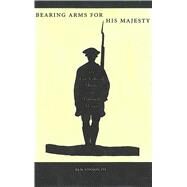Bearing Arms for His Majesty
, by Vinson, Ben, III- ISBN: 9780804750240 | 0804750246
- Cover: Paperback
- Copyright: 1/1/2004
This study uses the participation of free colored men, whethermulatos,pardos, ormorenos(i.e., Afro-Spaniards, Afro-Indians, or "pure blacks"), in New Spain's militias as a prism for examining race relations, racial identity, racial categorization, and issues of social mobility for racially stigmatized groups in colonial Mexico. By 1793, nearly 10 percent of New Spain's population was made up of people who could trace some African ancestrypeople subject to more legal disabilities and social discrimination thanmestizos, who in turn fell below white creoles, who in turn fell below the Spanish-born, in the stratified and caste-like society of colonial Spanish America. The originality of this study lies in approaching race via a single, important institution, the military, rather than via abstractions or examples taken from particular regions or single runs of legal documents. By exploring the lives of tens of thousands of part-time and full-time free colored soldiers, who served the colony as volunteers or conscripts, and by adopting a multi-regional approach, the author is able not only to show how military institutions evolved with reference to race and vice versa, but to do so in a manner that reveals discontinuities and regional differences as well as historical trends. He also is able to examine black lives beyond the institution of slavery and to achieve a more nuanced impression of the meaning of freedom in colonial times. From the 1550s on, free colored forces figured prominently in the colony's military forces, and units of free colored soldiers evolved with increasing autonomy in the seventeenth and eighteenth centuries. The author concludes, however, that the Bourbon reforms of the 1760swhich clearly expanded the military establishment and the role of Spanish soldiers born in the New Worldcame at the expense of free colored companies, which experienced a reduction in both numbers and institutional privileges.







